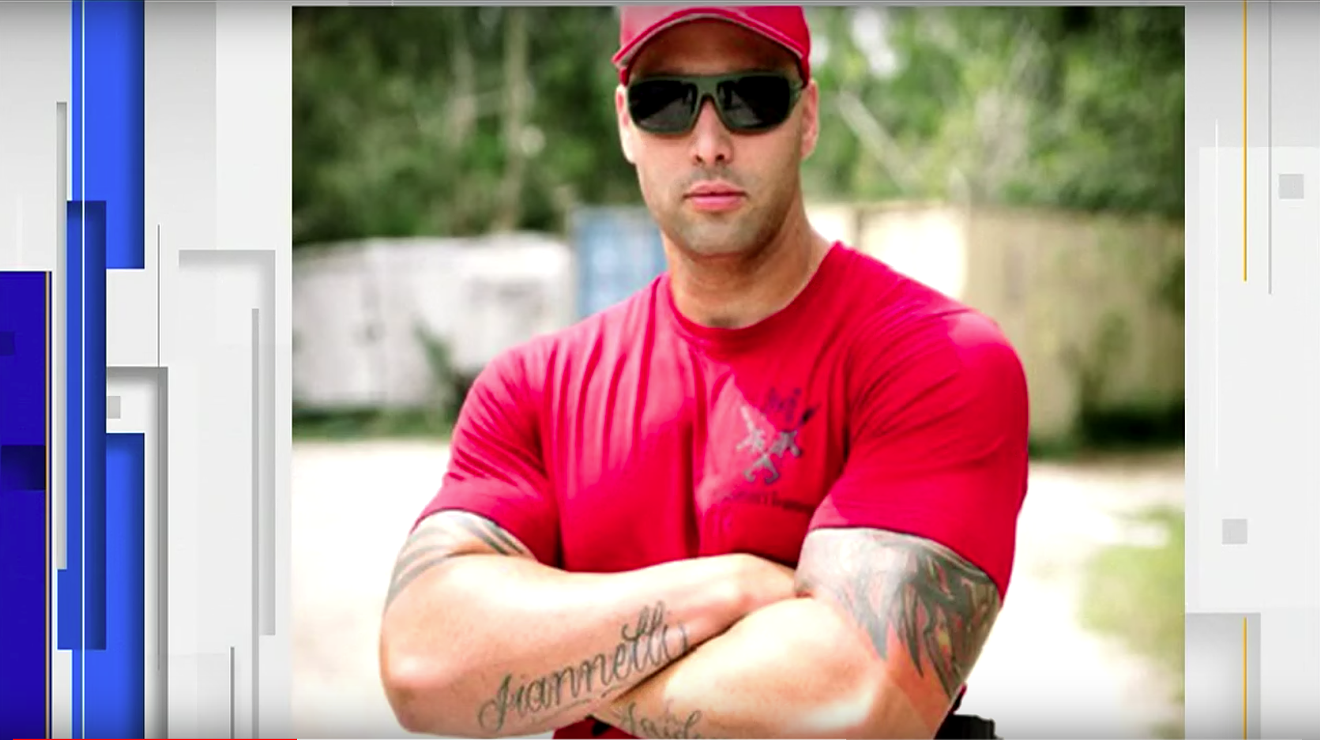Last week Jesus "Jessie" Menocal, Jr., received a three-year sentence on charges that he used his position as a Hialeah police officer to sexually coerce multiple victims, and victims are now devastated by a sentence they believe doesn't fit the crime.
The Miami Herald previously reported that at least four women and girls claimed Menocal assaulted or raped them in 2015. Prosecutors say his modus operandi involved bringing young women into city alleyways or secluded locations inside a local police station, where he would sexually exploit them while taking advantage of his authority as a sergeant.
According to court documents, one victim, a 19-year-old woman, was walking down a street in Hialeah when Menocal pulled up and asked her to ride with him, telling her it was not safe for her to walk alone at night. She initially refused, but he allegedly pressured her into his police vehicle, then brought her to an empty alley and sexually assaulted her.
In another instance, court documents state that Menocal sexually exploited a woman in custody who was having a mental health crisis, and told her he would release her in exchange for a sexual favor. The woman was taken by Menocal to a bathroom in Hialeah Police Substation 5, where he allegedly coerced her into performing oral sex on him. He then put her back in handcuffs and ordered another officer to drive her to a hospital for an involuntary psychiatric evaluation.
So how did Menocal get only three years and not decades — or life — in prison?
Last March, Menocal, the son of a former Sweetwater police chief, admitted to civil rights violations in connection with those encounters and other acts of sexual misconduct, all of which occurred between 2014 and 2015. The Miami-Dade State Attorney's Office declined to prosecute and the U.S. Department of Justice claimed there were gaps in civil rights law that made it difficult to bring a felony case. Instead, Menocal pleaded guilty to three misdemeanor federal counts with a maximum sentence of one year each.
Menocal secured his plea deal just in time to avoid the prospect of a much longer sentence. It was less than two weeks after he finalized the plea deal that a new federal law went into effect laying out stricter penalties for civil rights violations by police officers who use their badge to sexually coerce victims. The measure expanded on Section 242 of the U.S. Criminal Code, which is typically used in excessive-force cases and covers "deprivation of rights under color of law."
Under the old law, felony civil rights charges against state and local police officers for sexual abuse were limited to cases in which an officer threatened a victim with serious harm, inflicted bodily injury, kidnapped them, drugged them, or physically forced the sexual contact, among other aggravating factors.
Now federal prosecutors can bring the felony charges — and seek a life sentence — against state and local officers for sexual abuse regardless of whether those aggravating factors are at play. The changes were part of the Closing the Law Enforcement Consent Loophole Act, which Congress passed in March as part of an appropriations bill.
Southern District of Florida prosecutors suggest in their sentencing memorandum that they would have had more leverage against Menocal if the new law had been in place during plea negotiations. They claim their options were limited when prosecuting a non-federal officer for sex offenses committed outside federal property.
"Under the law in force at the time of the defendant’s criminal conduct, and even at the time of his change of plea, there were no felony enhancements...for non-aggravated sexual abuse, abusive sexual contact and the sexual abuse of a ward," the sentencing memo states.
Federal civil-rights cases against local police officers for sexual misconduct are relatively rare. But even before the statutory overhaul last March, the feds did occasionally bring felony charges in police sex-abuse cases comparable to Menocal's. One such case involved Matthew Lee Sepulveda of the Progreso Police Department on the U.S.-Mexico border.
Sepulveda took a 17-year-old to a local police station after a June 2019 traffic stop and allegedly pressured him into letting Sepulveda perform oral sex on him in a squad room. The Texas officer was charged under the same civil-rights law that was used to prosecute Menocal. But in Sepulveda's case, federal prosecutors labeled his conduct as aggravated sex abuse with an element of kidnapping. He was sentenced to 30 years in prison in July 2021.
The Department of Justice declined New Times' request for comment on Menocal's case and referred back to a press statement.
"Menocal was sentenced to the statutory maximum which is a testament to the courage of his victims to come forward and tell their stories as well as the dedication of FBI Miami's Civil Rights squad," the statement reads.
David Lane, a civil-rights and criminal-defense attorney based in Colorado, tells New Times that Miami-Dade state prosecutors "who were inept or corrupt, or both," bear responsibility for not pursuing felony charges against Menocal.
Lane, who was not involved in the Menocal case, notes that long before its overhaul, Section 242 contained severe felony penalties for sexual abuse on federal property or by federal law enforcement.
But the law was not meant to prosecute local police officers, he says.
"The federal statute was not designed to go after rape charges in Florida. Statutes in Florida are designed to do that," Lane points out. "This is a crime under Florida law, flat-out sexual-assault law. I'm just shocked that the state didn't go after this cop."
As it happened, Menocal stayed on the Hialeah police force for four years after sexual misconduct claims against him came to light. Working under then-Hialeah Police Chief Sergio Velázquez, Menocal received a pay raise and was shuffled between departments as public scrutiny of the accusations against him mounted. He was fired in December 2019 after the FBI arrested him on the civil-rights charges.
Assistant State Attorney Johnette Hardiman, meanwhile, opted not to bring charges against the once-decorated SWAT officer. The Miami Herald reported that in a set of close-out memos, Hardiman scrutinized Menocal's alleged victims' credibility, referring to some of them as gang-affiliated and suggesting that one had ties to online sex-service ads.
Whether Menocal was shielded from local prosecution on account of his and his family's long history in law enforcement remains a topic of debate.
Menocal's father, Jesus Menocal, Sr., was the longtime chief of the Sweetwater municipal police department and worked there for years alongside Menocal's uncle, Ignacio, who is still an active officer. (Ignacio and Jesus Sr. have dealt with their own controversy, arising from a 1980s internal investigation into Ignacio's suspected dealings with a drug trafficker.)
Jesus "Jessie" Menocal was an officer for 13 years before his arrest, working on a SWAT team's crime-suppression unit before being promoted to sergeant at age 25.
Miami-Dade State Attorney Katherine Fernandez Rundle has maintained that Menocal was subjected to a full investigation by her office. She said in a 2019 statement that the office lacked "sufficient evidence to ethically file state sexual assault charges.... However, we did not give up on this matter. Recognizing that Federal Civil Rights charges might be viable, we referred this matter to the DOJ for further investigation in 2016."
Menocal is scheduled to surrender to federal custody on July 11 to serve out his prison term. His plea deal forbids him from seeking employment as a law-enforcement officer once he gets out of jail. He is not required to register as a sex offender in Florida.
[
{
"name": "Air - MediumRectangle - Inline Content - Mobile Display Size",
"component": "19274298",
"insertPoint": "2",
"requiredCountToDisplay": "2"
},{
"name": "Editor Picks",
"component": "17482312",
"insertPoint": "4",
"requiredCountToDisplay": "1"
},{
"name": "Inline Links",
"component": "18711090",
"insertPoint": "8th",
"startingPoint": 8,
"requiredCountToDisplay": "7",
"maxInsertions": 25
},{
"name": "Air - MediumRectangle - Combo - Inline Content",
"component": "17482310",
"insertPoint": "8th",
"startingPoint": 8,
"requiredCountToDisplay": "7",
"maxInsertions": 25
},{
"name": "Inline Links",
"component": "18711090",
"insertPoint": "8th",
"startingPoint": 12,
"requiredCountToDisplay": "11",
"maxInsertions": 25
},{
"name": "Air - Leaderboard Tower - Combo - Inline Content",
"component": "17482313",
"insertPoint": "8th",
"startingPoint": 12,
"requiredCountToDisplay": "11",
"maxInsertions": 25
}
]












